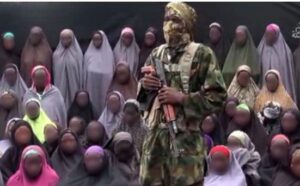Panic As Chibok Girls Forced Into Motherhood, Returned To Their Abductors

Between 2016 and 2023, no fewer than 21 Chibok girls who escaped captivity or were rescued by the military, returned with 34 children, a recent report by the Murtala Muhammed Foundation has shown.
The children aged between five months and seven years now live with their mothers who struggle to move on from the trauma they went through.
A screenshot of a propaganda video released by Boko Haram in 2014 after the girls were kidnapped
Some of the mothers, however, returned to their (former) Boko Haram husbands to nurture the children they had together while in captivity.
In the early hours of 14 April 2014, Boko Haram insurgents seized 276 girls from their dormitories at Government Girls Secondary School, Chibok, Borno State.
The terrorists put the girls in trucks and headed for Sambisa forest, but 57 girls were lucky to jump off the trucks. One of them later obtained an associate degree from a US college in 2019.
Their abduction sparked local and international outrage, a scenario that birthed a global movement, #BringBackOurGirls.
Subsequently, 128 others were rescued or escaped in batches between 2016 and 2023. However, 91 others are still missing and their parents still keep hope to reunite with them even though some of them are believed to have died.
Some of the girls who returned home had, unwillingly, turned into mothers with some choosing to remain with their Boko Haram ‘husbands.’
“We had been childless for five years before Jinkai came. Her name means God’s Grace,” said Falmata Yama, the mother of Jinkai, one of the Chibok girls.
Mrs Yama’s account of her experience was documented in a book — The Stolen Daughters of Chibok — authored by Aisha Muhammed-Oyebode, a human rights activist.
Jinkai spent eight years in captivity before returning home with three children. She was rescued alongside two others on 7 September 2022.
Jinkai said she found love with her (former) Boko Haram husband whom she now lives with in Maiduguri, the capital of Borno State, the epicentre of the Boko Haram insurgency.
However, the relationship between Jinkai and her parents has now strained, according to a BBC report. They are angry she decided to go back to a (former) terrorist.
She was not alone in this tangle. Other Chibok escapees like Aisha Grema and Mary Dauda who escaped captivity in 2022 explained why they are still in love with their ex-Boko Haram fighters.
“We have been married for eight years,” Grema, who escaped with her child, had said. “I first came out of the forest and then he followed me. There in the bush, we had no relatives, no brother, no sister, that is why we decided to come out.”
She explained that her husband was deradicalised before they were allowed to stay together.
The deradicalisation programme by the Borno State Government provides a window for the terrorists to be reintegrated back into society. More than 160,000 ex-terrorists have taken advantage of the amnesty.
Moving on after the infamous night of 14 April 2014
Out of the 219 girls who were taken into the forest, Amina Nkeki was the first to escape two years later.
She was found with her insurgent husband, Mohammed Hayatu, with whom she had a girl child, now eight years old.
Amina and some of the other victims of the Chibok abduction now study at the American University of Nigeria (AUN) in Adamawa State, on a government scholarship.
Murtala Muhammed Foundation, in its recent report, detailed how the Chibok girls regained their freedom between 2014 and 2023.
Five months after Amina was rescued in May 2016, 21 other Chibok girls were released after a swap deal brokered by the Swiss government and the International Committee of the Red Cross.
In November, another Chibok captive, Maryam Ali-Maiyanga was found with a child.
In May 2017, 82 of the abducted girls were released, following another negotiation with the terror group.
Four months earlier, another Chibok captive, Rakiya Gali, was rescued with a child.
In 2018, only one girl, Salomi Pogu, was rescued.
There would not be another breakthrough for the remaining captives until 2021 when another four regained freedom (two escaped and the two others were rescued).
The following year, 11 others were rescued. Last year, four of them were rescued, bringing the figure to 128.












































